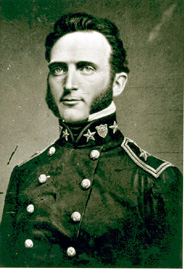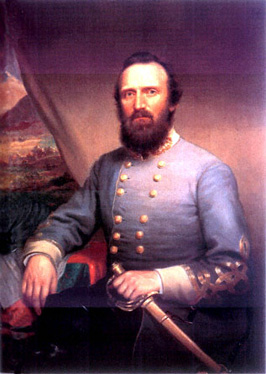

 Thomas J. "Stonewall"
Jackson Thomas J. "Stonewall"
Jackson 
(1824-63)
American soldier, considered by military authorities
an outstanding leader, a skilled tactician, and one of the ablest
Confederate commanders. |
|


|
Jackson was born Thomas Jonathan Jackson on January 21, 1824,
in Clarksburg, Virginia (now in West Virginia), and was educated
at the U.S. Military Academy. Following his graduation (1846)
from West Point he participated in the Mexican War until 1848.
He became an instructor at the Virginia Military Institute (VMI)
in 1851, and the next year he resigned from the army. On the
outbreak of the American Civil War in 1861, he left VMI to enter
the Confederate army. He was immediately commissioned a colonel
and within months was given the rank of brigadier general. |
|

|
Jackson earned his popular nickname at the First Battle
of Bull Run (1861), where his troops stood against the Union
forces "like a stone wall," according to a colleague,
Brig. General Barnard E. Bee. While commanding his troops, the
so-called Stonewall Brigade, during a campaign in the Shenandoah
Valley in the spring of 1862, Jackson executed a remarkable tactical
maneuver against three Union armies then menacing Richmond. After
driving back the army of General Nathaniel Prentiss Banks (1816-94),
which was advancing from the north, Jackson turned and defeated
the armies threatening to attack his rear ranks from the east
and west. |
|
|
Jackson subsequently took part, with General
Robert E. Lee, in the defeat of General
George McClellan in the Seven Days' Battle at Richmond. In
August 1862, Jackson defeated the army of General John Pope,
thus ensuring a Confederate victory at the Second Battle of Bull
Run. Jackson then crossed the Potomac into Maryland with Lee,
who ordered him to capture Harpers Ferry. His task accomplished
in September 1862, Jackson rushed north to Antietam Creek to
aid Lee, who was under attack by an overwhelming Union force. |

|
Jackson commanded the right wing of the victorious Confederate
army at Fredericksburg in December 1862. During the Rappahannock
campaign in Virginia the following spring, by launching a surprise
attack on the rear columns of the Union army, Jackson prevented
the threatened encirclement of the Confederate forces by the
troops of General Joseph Hooker. |
|
On May 2, 1863, while leading his forces at Chancellorsville,
Jackson was accidentally shot while reconnoitering with members
of his staff. The 18th North Carolina Infantry Regiment was responsible
for the "friendly fire" incident. Jackson was struck
by three .57 caliber bullets. He was taken to a field hospital
near the battlefield, where his left arm was amputated. On May
4, Jackson was moved to a field hospital at the home of Thomas
and Mary Chandler, near Guiney Station, approximately 30 miles
from the battlefield. Jackson died at 3:15 p.m on May 10th. Ironically,
his wounds were healing and he was recovering well in that regard,
but pneumonia set in which worsened and actually was what caused
his death.
His last words were "Let us cross over the river
and rest under the shade of the trees."
On May 15, Jackson's funeral took place in Lexington, Virginia,
the town that was Jackson's home during his years as Professor
at VMI.
His wife, Mary Anna Morrison Jackson, never remarried.
She was known as the "Widow of the Confederacy" and
lived until 1915. |
(See Bibliography below)
| Back to Timeline
| or click on your browser's "back to previous page"
button
©
Photographs: National Archives and Records Administration.
Photographed by George W Minnes, April 1863.
Bibliography: Bowers, John, Stonewall Jackson: Portrait of
a Soldier (1989); Chambers, Lenoir, Stonewall Jackson,
2 vols. (1959); Henderson, G. F., Stonewall Jackson and
the American Civil War (1896; repr. 1988); Krick, R., Stonewall
Jackson at Cedar Mountain (1990); Robertson, James I., Stonewall
Jackson--the Man, the Soldier, the Legend. New York : Macmillan
Library Reference USA, (1997); Tanner, Robert G., Stonewall
in the Valley (1976); Tate, Allen, Stonewall Jackson:
The Good Soldier (1957); Vandiver, Frank E., Mighty Stonewall
(1957; repr. 1988).
© Copyright "The American Civil War" - Ronald
W. McGranahan - 2004. All Rights Reserved.
![]()



